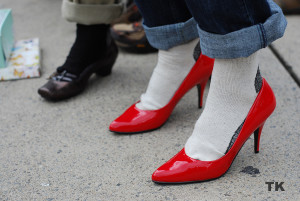By LB Klein, Jen Przewoznik, & Jeff Segal
 Every April, for Sexual Assault Awareness Month (SAAM), men all over the country stumble through public parks in high heels to raise awareness for the gender-based violence movement. Walk a Mile in Her Shoes© has been a staple of SAAM programming since 2001, and has been touted as “a world-wide movement” engaging “tens of thousands of men” in conversations on difficult topics like gender, power, and sexual assault in an accessible and fun way.
Every April, for Sexual Assault Awareness Month (SAAM), men all over the country stumble through public parks in high heels to raise awareness for the gender-based violence movement. Walk a Mile in Her Shoes© has been a staple of SAAM programming since 2001, and has been touted as “a world-wide movement” engaging “tens of thousands of men” in conversations on difficult topics like gender, power, and sexual assault in an accessible and fun way.
Men have embraced Walk a Mile in Her Shoes© – it’s very often the most well-attended SAAM event by men, and its popularity has helped raise tremendously needed funds for rape crisis centers and other anti-violence organizations nationally and internationally. However, many activists and organizers have begun to voice serious concerns over the popular event.
It is vital that we consider not only the intent but the impact of our sexual assault awareness events. In Walk a Mile in Her Shoes©, men step into high heels to show their solidarity with women. High heels are therefore held as emblematic of “women.” But while some women wear high heels, many women do not, and furthermore, women are often targeted specifically because they express themselves outside of the normative societal expectations of their gender. By equating high heels with “women,” we remove gender non-conforming women from our conversations about sexual violence entirely, and reinforce the common myth that people who present in ways that are considered masculine are not vulnerable to violence. Walk a Mile in Her Shoes© positions women as victims and men as perpetrators, but we need to also acknowledge that there are survivors of all gender identities, including men.
Walk a Mile in Her Shoes© also creates spaces that further marginalize transgender people. Forge, a national transgender rights organization, says activists should consider “whether they are re-victimizing more than a third of all victims by ignoring their very existence.” According to the National Transgender Discrimination Survey, 64% of transgender people have been sexually assaulted in their lifetime. Transgender women are often incorrectly and offensively described as “men wearing women’s clothing,” which is often used to justify violence against them. Transgender women, especially those of color, face not only an incredibly disproportionate risk of experiencing sexual and intimate partner violence but also street harassment, police brutality, homelessness, joblessness, incarceration, and murder. It is vital for people working to end gender-based violence to closely ally with transgender and non-binary people instead of holding events that exclude and further marginalize them.
It is evident that Walk a Mile in Her Shoes© has raised attention, awareness, and funds, but at what expense? We cannot afford to raise awareness by perpetuating an essentialist view of what people should wear, how they should look, act, and be. The Walk a Mile in Her Shoes© narrative is accessible because it is reductive, and oversimplification in our work is, quite literally, dangerous. Of course, communities should still hold awareness raising events, but we must be intentional about changing the exact norms that perpetuate violence instead of reinforcing them. Events that re-victimize, erase, or marginalize survivors in their very concept do not have a place in our field.
So, what else can we do instead to engage men during SAAM?
We can hold events that encourage folks of all genders working together. We can bring smaller groups of men together for meaningful conversation or larger groups for fundraisers that are not built around reinforcing harmful gender norms. Perhaps, as Forge suggests, we should hold events that encourage everyone to break stereotypes about gender and discuss how harmful gender norms perpetuate violence. Then, we will be raising awareness of the true message of the movement to end sexual assault: that to end sexual assault, we must change culture.
LB Klein, MSW has dedicated her professional and academic life to ending gender-based violence, supporting survivors, and advancing social justice. She is a Consultant and Lead Trainer for Prevention Innovations Research Center at the University of New Hampshire. She is based in Atlanta, GA and will begin pursuing a doctorate in the School of Social Work at the University of North Carolina at Chapel Hill this August.
Jen Przewoznik, MSW has over 15 years of experience working with/in women’s and LGBTQ communities as an educator, trainer, technical assistance provider, practitioner, and programevaluator. She is founder of the Queer Research Consulting Collaborative, a project designed to consult with researchers studying LGBTQ issues. Jen is currently the Director of Prevention & Evaluation at the North Carolina Coalition Against Sexual Assault and co-chairs the NC Sexual Violence Prevention Team and the NC Campus Consortium.
Jeff Segal, BS resides in NYC, where he works in the tech sector and moonlights as a professional dancer. He has been a part of the movement to end sexual violence for ten years. Jeff has four years of experience as a sexual violence crisis counselor, and currently is leading initiatives to make social dancing in New York a safer space.
